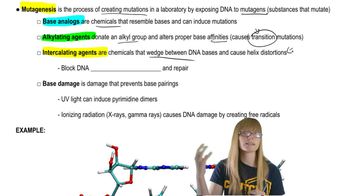Table of contents
- 1. Introduction to Genetics51m
- 2. Mendel's Laws of Inheritance3h 37m
- 3. Extensions to Mendelian Inheritance2h 41m
- 4. Genetic Mapping and Linkage2h 28m
- 5. Genetics of Bacteria and Viruses1h 21m
- 6. Chromosomal Variation1h 48m
- 7. DNA and Chromosome Structure56m
- 8. DNA Replication1h 10m
- 9. Mitosis and Meiosis1h 34m
- 10. Transcription1h 0m
- 11. Translation58m
- 12. Gene Regulation in Prokaryotes1h 19m
- 13. Gene Regulation in Eukaryotes44m
- 14. Genetic Control of Development44m
- 15. Genomes and Genomics1h 50m
- 16. Transposable Elements47m
- 17. Mutation, Repair, and Recombination1h 6m
- 18. Molecular Genetic Tools19m
- 19. Cancer Genetics29m
- 20. Quantitative Genetics1h 26m
- 21. Population Genetics50m
- 22. Evolutionary Genetics29m
17. Mutation, Repair, and Recombination
Induced Mutations
Problem 24b
Textbook Question
In 2010, a U.S. District Judge ruled to invalidate Myriad Genetics' patents on the BRCA1 and BRCA2 genes. Judge Sweet noted that since the genes are part of the natural world, they are not patentable. Myriad Genetics also holds patents on the development of a direct-to-consumer test for the BRCA1 and BRCA2 genes.
Would you agree with the ruling to invalidate the patenting of the BRCA1 and BRCA2 genes? If you were asked to judge the patenting of the direct-to-consumer test for the BRCA1 and BRCA2 genes, how would you rule?
 Verified step by step guidance
Verified step by step guidance1
<span>1. Understand the context: The BRCA1 and BRCA2 genes are naturally occurring sequences in human DNA, associated with increased risk of breast and ovarian cancer. The ruling in question invalidated patents on these genes themselves, not on any specific technology or method related to them.</span>
<span>2. Consider the legal and ethical implications: Patenting naturally occurring genes raises ethical concerns about ownership of parts of the human genome. The ruling suggests that genes, as products of nature, should not be owned by any entity.</span>
<span>3. Evaluate the distinction between genes and tests: While the genes themselves are natural, a direct-to-consumer test involves a specific method or technology to analyze these genes. This could be considered an invention, potentially eligible for patent protection.</span>
<span>4. Analyze the criteria for patentability: For a test to be patentable, it must be novel, non-obvious, and useful. Consider whether the direct-to-consumer test meets these criteria, focusing on its innovation and application.</span>
<span>5. Formulate a ruling: Based on the analysis, decide whether the test represents a patentable invention. Consider the impact of patenting on accessibility, innovation, and public health.</span>
Recommended similar problem, with video answer:
 Verified Solution
Verified SolutionThis video solution was recommended by our tutors as helpful for the problem above
Video duration:
1mPlay a video:
Was this helpful?
Key Concepts
Here are the essential concepts you must grasp in order to answer the question correctly.
Gene Patenting
Gene patenting refers to the legal practice of obtaining exclusive rights to specific genes or genetic sequences. This concept raises ethical and legal questions about ownership of natural biological materials. The ruling against Myriad Genetics highlighted the argument that genes, being products of nature, should not be patented, as this could hinder research and access to genetic testing.
Recommended video:
Guided course

Mapping Genes
BRCA1 and BRCA2 Genes
BRCA1 and BRCA2 are human genes that produce proteins responsible for repairing damaged DNA. Mutations in these genes are linked to an increased risk of breast and ovarian cancers. Understanding the role of these genes is crucial for evaluating the implications of their patenting, particularly in terms of public health and genetic testing accessibility.
Recommended video:
Guided course

Mapping Genes
Direct-to-Consumer Genetic Testing
Direct-to-consumer (DTC) genetic testing allows individuals to access genetic information without the need for a healthcare provider. This concept raises questions about the accuracy of tests, privacy concerns, and the potential for misinterpretation of results. Evaluating the patenting of DTC tests involves considering consumer rights, ethical implications, and the impact on healthcare.
Recommended video:
Guided course

Modern Genetics

 4:29m
4:29mWatch next
Master Induced Mutations with a bite sized video explanation from Kylia Goodner
Start learningRelated Videos
Related Practice


